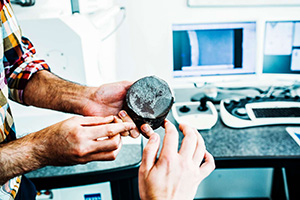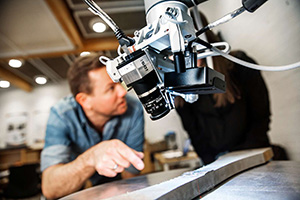
Applications for advanced characterisation
The performance of a product is linked to an understanding of the materials it consists of. Material structures and the development of materials during operation are difficult to investigate.
This applies to both hard materials such as metal, cement, and ceramic materials, and soft materials such as plastic, gels, and emulsions. Below, you can get an overview of what the Danish Technological Institute can assist with.
 Formulation of suspensions and emulsions
Formulation of suspensions and emulsions
Stabilization of emulsions, colloidal suspensions, and solutions is crucial for products within foods, paints, personal care, and pharmacy. By optimizing the product composition and choosing the optimal stabilizer, it is possible to improve the function of the product, such as shelf life, texture, and homogeneity.
Read more
 Chemical composition and trace elements
Chemical composition and trace elements
Small variations in the components of a product have major implications for vital properties such as shelf life, toxicity, or possibilities for recycling. Furthermore, tracing of impurities can be important to e.g. obtain approval of a product for certain markets.
Read more
 Material structure and defects
Material structure and defects
With x-ray and neutron measurements, it is possible to look inside materials and map their inner structure. The analyses can provide information on both large and small structures, and e.g. visualize inner defects, cracks, water damage, and distribution of domains in multi-phase materials, magnetic domains, etc.
Read more
 Measurement of liquid and gas flow under real conditions
Measurement of liquid and gas flow under real conditions
X-ray and neutron analysis make it possible to probe the structure deep inside materials. Since X-ray and neutron images can be collected relatively quickly, it is possible to acquire series of images, effectively producing a film of components or materials in function
Read more
 Surface analyses with x-ray and neutrons
Surface analyses with x-ray and neutrons
Structures and coatings on surfaces can determine properties such as hydrophobicity, adsorption, corrosion, and electrical properties. Surface analyses with x-rays and neutrons can give access to unique understanding that can help to optimize properties for specific applications.
Read more
 Residual stress in metals
Residual stress in metals
Residual stress in metals affects product lifetime and performance. We offer measurement as a service to help clients optimize stress design and improve product design and material efficiency.
Read more
 Standardized residual stress measurements
Standardized residual stress measurements
By using the powerful X-ray radiation generated by synchrotrons, residual stresses can be measured at depths of several centimeters - approximately 2 cm in steel and 8 cm in aluminum - with high resolution down to 0.1 mm.
Read more
 X-ray and neutron facilities
X-ray and neutron facilities
Synchrotrons and neutron sources are large, often international, facilities where x-ray- and neutron beams are being produced. For more than 50 years, these beams have been applied for characterization of everything from metal components and batteries to emulsions and biological systems. The techniques are generally developed for highly specialized, academic use, but have now matured for general industrial use.
Read more